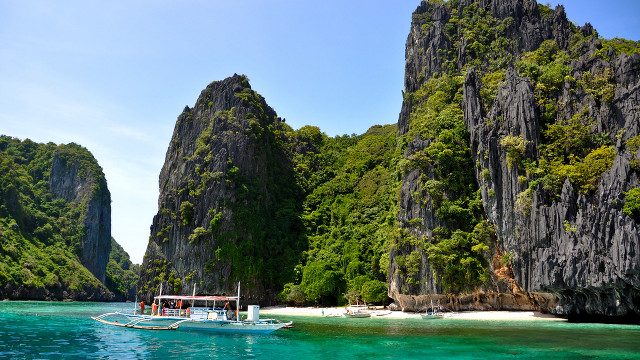SUMMARY
This is AI generated summarization, which may have errors. For context, always refer to the full article.

MANILA, Philippines (UPDATED) – Department of Environment and Natural Resources (DENR) Secretary Roy Cimatu announced on Thursday, August 1, that El Nido will remain open while rehabilitation continues in the area.
The secretaries of the DENR, the Department of Interior and Local Government (DILG), and the Department of Tourism (DOT) confirmed this decision in a press conference in Camp Aguinaldo.
The government, however, will continue to monitor El Nido’s establishments.
Cimatu said they will form an interagency task force to investigate and inspect establishments and “households close to the vicinity.” The task force has until August 25 to submit results of the investigation and inspection.
“Iha-highlight [ng investigation] ‘yung mga noncompliant or nagva-violate ng environmental laws,” he said. (The investigation will highlight the noncompliant establishments and those that violate environmental laws.)
Cimatu warned that based on the recommendation of the task force, establishments that violate environmental laws may face closure.
A July 16 document revealed that the government has been mulling over a “selective closure” of El Nido. The closure would have covered the barangays of Masagana, Maligaya, Corong-Corong, and Buena Sarte. (READ: Gov’t eyes selective closure of El Nido in Palawan)
Although El Nido remains open to tourists, swimming will continue to be restricted in areas found to have high fecal coliform levels.
“We will not close El Nido, but we will continue the rehabilitation by imposing a ‘No Swimming’ policy in certain parts of Bacuit Bay including the El Nido Estero Outfall, Cabugao Outfall, Masagana Outfall, and Corong-Corong Outfall,” Cimatu said.
DOT Secretary Bernadette Romulo Puyat said tourists can still swim in the islands surrounding El Nido where fecal coliform levels remain at normal levels.
Aside from high fecal coliform levels, the problems El Nido faces include easement concerns, business permit issues, and zoning violations.
“Maraming resorts na walang DOT accreditation. That’s illegal, isasara sila. Maraming nagtatayo sa timberland, automatic sarado na ‘yun,” Puyat said.
(Many resorts do not have DOT accreditation. That’s illegal, and they will be closed. Many of them build on timberland, those will automatically be closed down.)
Puyat blamed the previous mayor of El Nido for its worsening conditions.
“It’s hard for me to believe that the previous mayor did not see all these violations,” she said.
Meanwhile, DILG Secretary Eduardo Año said they will hold local officials accountable for the violations.
“Yes we will file charges against them. Titignan natin kung sino dapat managot dito (We will see who should be held accountable). Even the barangay captains and other agencies,” he said.
Even though swimming restrictions may affect tourist numbers, stakeholders in El Nido voiced their approval of the government’s efforts to rehabilitate the area.
Cimatu, Puyat, and Año will also visit other ecotourism sites such as Panglao, Puerto Galera, Siargao, and Coron. The government said they will use the “Boracay plan” as guide in rehabilitating other ecotourism sites. – Rappler.com
Aaron Tolentino is a Rappler intern from the Ateneo de Manila University.
Add a comment
How does this make you feel?
There are no comments yet. Add your comment to start the conversation.